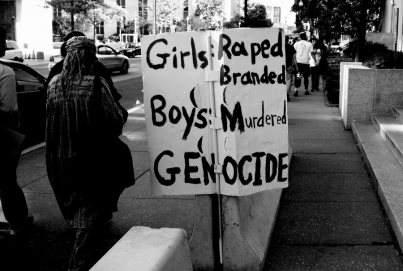10 years on: forgotten atrocities in Darfur
Susanne Østhus talks to Luse Kinivuwai, director of Darfur Australia Network, about the lacking media coverage of the war in Darfur and its implications.
After ten years the conflict in Darfur is still ongoing and has seen an increase in bombings. However, mainstream media’s coverage has shifted in recent years and is now mainly focusing on the Arab spring uprisings.
“The media coverage of the Darfur conflict has reduced in the last 4 years,” director of Darfur Australia Network (DAN), Luse Kinivuwai says.

Source: Flickr
Courtesy of: katmeresin
The conflict in Darfur is still violent and in July seven UN peacekeeping soldiers were ambushed and killed, 17 soldiers were wounded in the attack in Sudan’s western region. Later, in September, the Sudanese air forces (SAF) allegedly bombed Sudan’s east Jebel Marra for three days straight.
According to United Nations information service Vienna it is estimated that the genocide has claimed 200,000 lives and caused 2 million to be displaced from their homes (There are only estimates so far, no confirmed accurate numbers).
“There is still a lot of unrest in Darfur, the Sudanese air force continues to bomb parts of Darfur, rebel and government forces continue to clash in the region and tribal conflicts are ongoing making it a very complicated layered conflict,” Kinivuwai says.
What sparked the conflict in 2003 was an uprising launched by non-Arab ethnic groups, Sudan Liberation Movement/Army (SLM/A) and Justice and Equality Movement (JEM), against the Sudanese government. To which the government responded in orchestrating the mass murder of civilians by arming the Janjaweed militia.
At the height of the conflict, media worldwide had its eyes on the mass murders in Darfur. Kinivuwai says the active campaigning from celebrities such as George Clooney helped keep media interested in the atrocities happening in Darfur.
George Clooney told the Sun that the case of Darfur has “been the greatest failure of my life”.
Ten years on and little has changed for the better in Darfur, a conflict worryingly similar to the Rwandan genocide.
The International Criminal Court has laid ten charges against President Omar al-Bashir and issued a warrant for his arrest. Bashir has rejected these charges, but more problematic is that he is still president in Sudan, which is a huge hindrance to UN’s peacekeeping mission (UNAMID).
The lack of progress by UN’s peacekeeping mission, unsuccessful arrest of Omar al-Bashir and the emergence of new uprisings in the Middle-East has made Darfur into a forgotten conflict.
“The media has turned its attention to the Arab Spring movements across Arab countries such as Libya, Egypt and now in Syria,” Kinivuwai says.
The mass killings continue in Darfur, but the eyes of the world are elsewhere.

Recent Comments